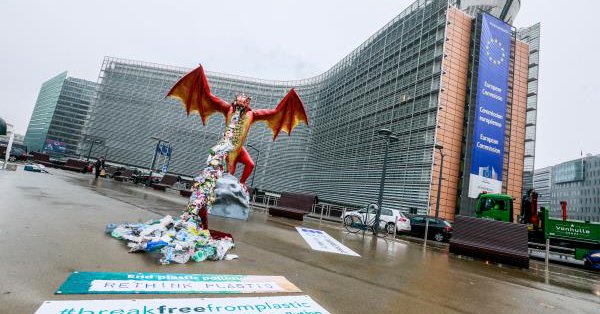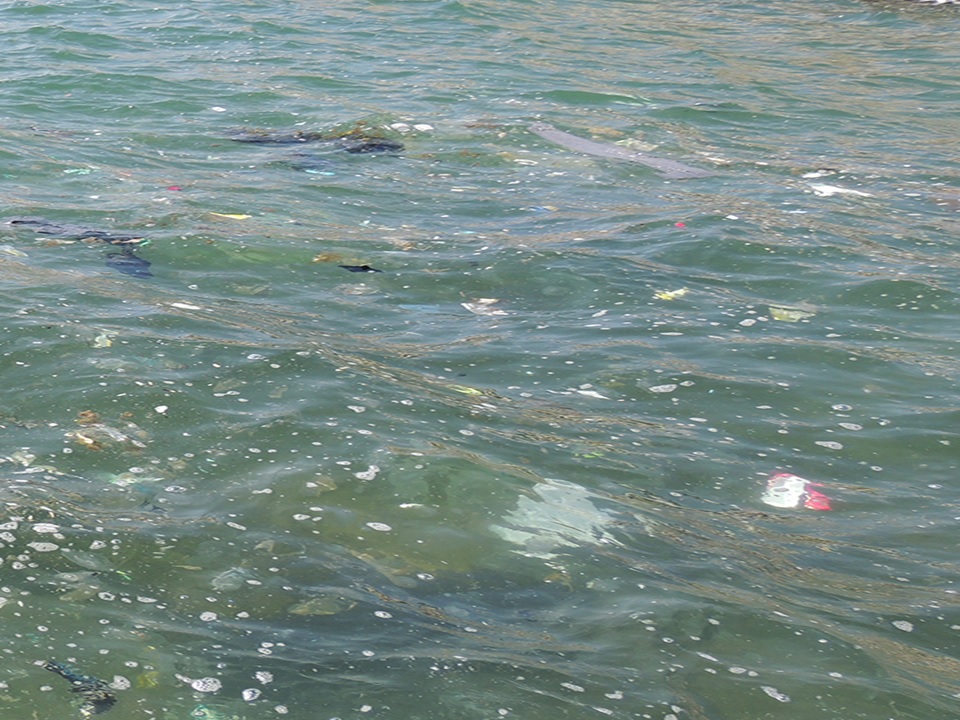(story by Cyprus News Agency’s Fanitsa Zannettou, Edited in English by Rebekah Gregoriades)
Everyone must contribute and take responsibility in order to address the plastic pollution of the seas, coordinator of project “Keep our Sand and Sea Plastic Free”, Panayiota Koutsofta, has told CNA, noting that 80% of waste collected from Cyprus’ beaches is plastic.
On the occasion of the placing on an Ayia Napa beach of “Evdokia”, a whale sculpture made by students of the Paralimni Lyceum for the “Keep our Sand and Sea Plastic Free” campaign, with an aim to collect plastic packaging, Koutsofta said “the awareness of the public regarding waste in the sea is a very important issue for which the European Union itself is taking action, with an aim to reduce plastic pollution and especially disposable plastics.”
She added that “the gradual withdrawal of disposable plastics, for which there are alternatives, such as cutlery, straws, cotton buds etc., begins in 2021.”
“The World Economic Forum warns that if the disposal of plastics continues at the same rate, by 2050 our seas will contain, in weight, more plastic than fish,” Koutsofta pointed out, adding that if the current situation continues, “it is estimated that by 2025 our seas will contain a tonne of plastic for every three tonnes of fish.”
She noted that “about 33,800 pieces of plastic waste end up in the Mediterranean waters ever minute, while about 80% of waste collected from Cyprus’ beaches is plastic.”
Koutsofta explained that “the largest percentage of plastic ending up in the sea comes from the land, and the consequences on marine life are tragic, with millions of sea birds and thousands of marine animals dying every year.”
“However, the plastic waste ending up in our seas is not only have detrimental for marine life, but also affects humans, since through the food chain the plastic can find its way onto our plates, with unknown yet consequences on human health,” she said.
It is estimated, Koutsofta noted, that “the cost of sea waste on the tourism and fishing sectors is 259-695 million euros a year.”
Referring to “Keep our Sand and Sea Plastic Free”, she said the campaign is an initiative by TUI Care Foundation, in cooperation with Travel Foundation and the Cyprus Sustainable Tourism Initiative, with an aim to eradicate disposable plastics in coastal areas, starting with Ayia Nana, Protaras and the broader region of the Famagusta District, with emphasis on the tourist industry.
She said “our aim is for the Famagusta District to become a shining example of reducing disposable plastics and become a source of inspiration both for the other coastal towns of Cyprus and the world, since the campaign is being promoted abroad through the TUI Care Foundation network.”
“Keep our Sand and Sea Plastic Free” aims at “supporting hotels, bars and restaurants in the area through training and guidance in finding alternative solutions for the use of plastic products, such as straws, cups, cutlery, bottles, bags, and food containers.”
Koutsofta said that for the campaign it was “very important that the four municipalities of the Famagusta District believed in our vision and supported it right from the beginning and continue to provide this support.”
Information about “Keep our Sand and Sea Plastic Free” can be found on the campaign’s website and social networks, hosting daily actions, in which interested individuals and the tourist industry can contribute to reducing the use of disposable plastics.
Koutsofta called on any hotels or restaurants to interested in cooperating and adopting alternative solutions, some of which are also cost-effective, to contact the campaign.
“A plastic bottle needs about 450 years to decompose. If we throw a plastic bottle into nature today, there will still be traces of it after about 18 generations. The first stage in the problem of sea waste is to avoid its production, wherever possible, and then manage the waste,” she said.
She also noted that “the contribution of all involved parties, students and their parents, is important and they must take action to replace plastic bottles with water flasks.”
“We also call on the authorities to provide students in all schools of Cyprus with taps for potable and filtered water,” she said, adding that “each individual must consider and take their share of the responsibility in addressing the pollution of the seas with plastic.”
Photo caption:
Discarded plastic water bottles are washed up on a beach in Lung Ha Wan, New Territories, Hong Kong, China, 06 December 2018. Hong Kong’s leading beverage producers and bottlers representing around half of all bottled water and soft drinks sold in the city joined with major Hong Kong retailers, recyclers and NGOs to announce a new campaign called ‘Drink Without Waste’. It aims to cut the 1.7 billion used and discarded beverage containers, much of which end up in Hong Kong’s landfills, countryside, beaches and the marine environment each year. According to Deloitte China, over one billion litres of packaged beverages were consumed in Hong Kong in 2017. The Single-Use Beverage Packaging Working Group aims to reduce single-use beverage packaging and to recover 70 to 90 percent of plastic bottles and liquid cartons in the city by 2025. The group’s recommendations to producers, importers, retailers, waste management services, Hong Kong consumers and the Hong Kong government are to; reduce single-use beverage containers, regulate packaging standards, recover used packaging, and increase recycling. Plastic recycling rates in Hong Kong remain far less than in the United States, Germany, South Africa, South Korea and Taiwan. EPA/ALEX HOFFORD



